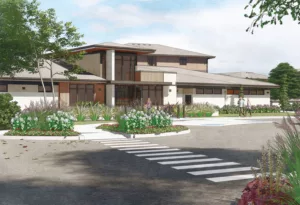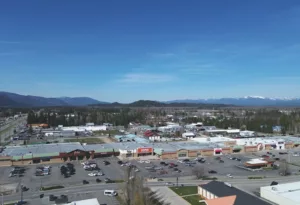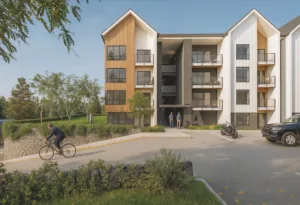
Home » Five Takeaways: Building a Professional Sports Franchise in Spokane
Five Takeaways: Building a Professional Sports Franchise in Spokane
with Katie Harnetiaux, president of USL Spokane
_web.webp?t=1710400318&width=791)
Katie Harnetiaux, president of USL Spokane, discusses the opportunities and expectations for the sports franchises' upcoming seasons.
| Carson AllenMarch 14, 2024
The Journal of Business hosted Katie Harnetiaux, president of USL Spokane, for its most recent Elevating The Conversation podcast. The episode was recorded on Feb. 29, about a week before the first-ever match for the Spokane Velocity professional men's soccer team, on March 8, and two weeks before its inaugural home game, on March 16.
The Spokane Zephyr professional women's soccer league will begin play this summer, as one of the eight original teams in the United Soccer League Super League.
The season's start marks the culmination of an 18-month process for Katie Harnetiaux and her husband, Ryan, who formed Aequus Sports LLC to launch the new sports franchises, then bringing business partners. In the conversation, we talk to Katie about how they started and what to expect for the new seasons.
The Elevating The Conversation podcast is available on Apple Podcasts, Amazon Music, Spotify, and elsewhere. Search for it on any of those platforms or the Journal's website to hear the entire conversation, but for now, here are five takeaways from the 30-minute episode.
1. Professional soccer essentially has three revenue streams. A professional soccer organization has ticketing—butts in seats—partnerships and sponsorships, and merchandise. That's pretty much it. Those are the inputs to the bottom line of the business. And what we have focused on this year is really finding partners that want to work with us that support the ideals of what we're doing.
When we started out doing this, we talked about the fact we are doing this on behalf of Spokane. We see this as a legacy in the ability for this stadium, this infrastructure, this business to ultimately be a community asset.
Ryan and I will not be here someday. We would love to know that these professional teams continue to go on. That happens if the Spokane business community invests in this as well, which ultimately is a pretty brave thing when we're talking to them about something that has not existed yet.
The men haven't taken the pitch yet. For a long time, the stadium wasn't completed, and we were painting this story of what it could be in Spokane. We have been so proud to partner with the businesses that have come forward and said, 'Yeah, we see this as a community asset. We see this as something that ultimately brings in businesses to Spokane.'
Our players are moving into Spokane. They need to shop somewhere. They need to get bank accounts. Having these partnerships with these businesses help us set these men and women up for success in moving into our our community. But also, it sort of fills in the infrastructure of this organization and it says, 'Hey, we've got you.'
2. Expectations for ticket sales are high. The stadium seats about 5,500 people. I would love if we were averaging 4,500 people per game.
We're almost sold out of our first game, and we have about 2,000 season tickets sold already.
I'd like to see us sell more. When you put professional players on the field, you want them to know that the community is standing behind them, and so that's what those butts in seats represent. It's obviously a revenue stream, and it's an important revenue stream. I want to say thank you to all the people that put down season-ticket deposits early on because it kept us going in dark days when we started this. It was incredibly helpful for us to know that we had that push behind us from the community. Those people there saying, if you build it, we will come. And that was helpful.3. ONE Spokane Stadium is constructed to maximize exposure. When we started working with the Spokane Public Schools (owner of the stadium) and Spokane Public Facilities District (stadium operator) on the building of the stadium, we invested about $4 million into upgrades. The turf that we will all play on, including high schoolers, is International Federation of Association Football-grade turf. So we could host a World Cup event, at some point, because we have the appropriate turf.
We also invested in the lighting in there. There's a special number of lumens that the lights have, which ultimately means it will look like daylight at any time of day when you play in that stadium. It's also the required amount of lighting for ESPN and CBS, so that our games can be nationally televised.
The stadium is truly state of the art. We're incredibly lucky to be able to play there.
4. Super League expands opportunities for women. Super League is Division I Women's Soccer, so that's at the same level as National Women's Soccer League. We will play at the highest level for professional women in the United States, so with Spokane Zephyr, what we have done is we have extended opportunities for women to play soccer in America.
There are 11 NWSL teams. With Super League, during the inaugural season, we're adding eight additional teams. A really great statistic is, the NWSL just had its draft. There were roughly 400 women that went out for the draft. They drafted 40 players. There just aren't enough spots.
So, the inaugural season will have eight teams. (USL plans to add another eight clubs for the 2025 season.) We are so incredibly lucky to have Super League in Spokane. The other cities are quite a bit larger, major metropolitan areas. USL understood that Spokane would rally around sports and specifically women's sports. It's evident in the support for the Zags women's basketball team. They're amazing, and their coaching is amazing.
5. The fan experience will be different from other sports. When you think about the sphere of soccer fandom, we have captured that core. Those people who get up on Saturday and Sunday mornings and watch Premier League and get excited to have a European team they're rooting for. Those people have been with us from the get-go. They are very excited that soccer is coming to Spokane.
We are partnering closely with our support group, which is called the 509 Syndicate. They are building chants there. They are going to come in with drums. They are going to have all sorts of cool things. They're true fans. They'll have a section at the stadium.
Then we have a little bit of that outer range maybe has a kid who played. Maybe they coached. They're just excited that there's something else to do and this is going to be really fun.
And then there's that person who is outside of the sphere, which is really the person who's like, 'I don't know much about soccer, but I want an incredible experience.' And we're going to have food trucks and fireworks and music and merch, and there's going to be an incredible soccer game going on.
So if you are a person who's really just going for the food or because it's cool or to have a beer with my friends, I bet you by the end of the season, I've got you converted to being a soccer fan.
Once you know these guys, once you meet these women, once you see them on a biweekly basis out there. And you run into him at the Spokane Club and you see him at the restaurants, you're going to start to attach to these players. And they're going to end up being like hometown heroes. That's how we're going to get that outer person.
Latest News Insights
Related Articles
Related Products





